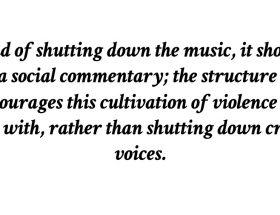The Academy Awards, also known as The Oscars, has an infamous history of overlooking minorities and showing a lack of diversity in their list of nominations, even when the films nominated that year did not portray that lack of diversity. In 2015 and 2016, two years in a row, only white actors and actresses were nominated in the Acting categories. This led to the Twitter hashtag #OscarsSoWhite, which sparked a conversation on the lack of diversity in the Academy Awards. Actor David Oyelowo, who was considered a potential nominee for his portrayal of Martin Luther King in Selma was memorably overlooked in 2015. He referred to the lack of diversity as “unforgivable” and called it “a problem that needs to be solved.” The Oscars still are not perfect, but they have grown a lot over the last two years. This most recent Oscars ceremony, which took place in February of this year, and the Oscar nominations in the years following 2016, shows how the Academy has grown in its inclusion of people of color.
A 2016 study, conducted by the University of Southern California, analyzed more than 21,000 characters and 400 films and television shows released in 2014 and 2015. The researchers found that only “28.3% of characters with dialogue were non-white racial/ethnic groups, though such groups are nearly 40% of the U.S. population.”
Following the 2016 Academy Awards nominations (note that this was the second year in a row only white people were nominated), the Academy of Motion Picture Arts & Sciences itself acknowledged the problem in a statement from Academy President Cheryl Boone Isaacs. In her statement, she said that she was “both heartbroken and frustrated about the lack of inclusion. This is a difficult but important conversation, and it’s time for big changes.” The Academy will apparently “conduct a review of [their] membership recruitment in order to bring about much-needed diversity in [the] 2016 class and beyond.” She said that the Academy “recognize[s] the very real concerns of our community.”
These “concerns” she is talking about include how at the time of the 2016 Oscars, only fifteen African-American actors had ever won an Oscar since the awards ceremony was established in 1929. In 1939, Hattie McDaniel became the first African-American actress to win an Oscar, which was for Best Supporting Actress, and was for her portrayal of Mammy in Gone With the Wind. She accepted her groundbreaking award in a groundbreaking moment- in a segregated hotel. Then, after a twenty-seven-year gap, in 1963, Actor Sidney Poitier became the second African-American person ever to win an Oscar, for Best Supporting Actor for his portrayal of Homer Smith in Lilies of the Field. In addition, only one Hispanic actor, José Ferrer, has ever won the “Best Actor” category, which he won in 1950 for his role in Cyrano de Bergerac. No Hispanic woman has won the “Best Actress” award yet.
In 2016, in a statement titled “Academy Takes Historic Action to Increase Diversity,” the Academy discussed “The Board’s goal to commit to doubling the number of diverse members of the Academy by 2020.” The Academy said they will launch “an ambitious, global campaign to identify and recruit qualified new members who represent greater diversity.” In order to see a faster change and immediately increase diversity, “the Academy will establish three new governor seats.” The Academy said they would also “take immediate action to increase diversity by adding new members who are not Governors to its executive board committees where key decisions about membership and governance are made.”
Recently, however, in just the past couple of years, the Oscars have been including more minority groups, when they weren’t justly recognized years prior. In this past Oscar season alone, minorities were recognized for their groundbreaking portrayals in some incredible films. Rami Malek, who is American by nationality and is ethnically Egyptian and Greek, won Best Actor for his portrayal of Freddie Mercury in Bohemian Rhapsody. In addition, African-American actor Mahershala Ali won Best Supporting Actor for his role in Green Book, and African-American actress Regina King took home the award for “Best Supporting Actress” for her role in If Beale Street Could Talk. Also, this year, actress Yalitza Aparicio became the second ever Mexican actress to receive an Oscar nomination in the Best Actress category, for her portrayal of Cleo in Roma. She is also the very first indigenous woman ever to be nominated for Best Actress. Marina de Tavira was also nominated for Best Supporting Actress for her role in Roma, and she, too, is Hispanic. In the last couple of years, the Academy has been trying to better represent minorities in film.
In 2017, the year following the infamous Academy Awards controversy (when for two years in a row, only white actor were nominated), seven out of the twenty actor and actress nominations were non-white persons. Not only that, but three out of the nine best picture films nominated consisted of mostly African-American casts, and four out of the five nominated documentaries had African-American directors. This change that took place could be explained by Academy President Cheryl Boone Isaacs’ promise to diversity the Academy’s ranks, it could be explained by an increased commitment among Academy members to include more diverse films in their pickings, or it could be due to the random timing of more diverse Hollywood releases. Although it seems to be getting better, this year, however, was not perfect. Green Book which won Best Picture, is accused of being “white savior” film, which is essentially a film in which a white character “saves” a non-white character, making the white character the hero and focusing on him/her, versus the non-white character.
Obviously, The Oscars’ intention to drastically change the way minorities are viewed and represented has not been totally successful, but nothing happens instantly, as true change will take longer than just two years. Regardless, however, the Academy is finally trying, and any type of trying is good and needed. The viral hashtag, #OscarsSoWhite, has nearly come to an end, as far fewer people are tweeting it today, versus when over 250,000 people tweeted that hashtag in just one week alone in 2016. The Oscars still obviously have a ways to go, but the steps that they have taken so far show positive outcomes, as more minorities, at greater levels, are being represented in the awards ceremony and in the nominations. The Academy is still in the process of growing as an organization, and are working on including all persons who deserve recognition for their incredible work. Hopefully, this growth will become even greater as the next Oscar season approaches.
art by Allegra Tenenbaum




